Rutherford B. Hayes, Lucy and Spiegel Grove
By John T.
Marck
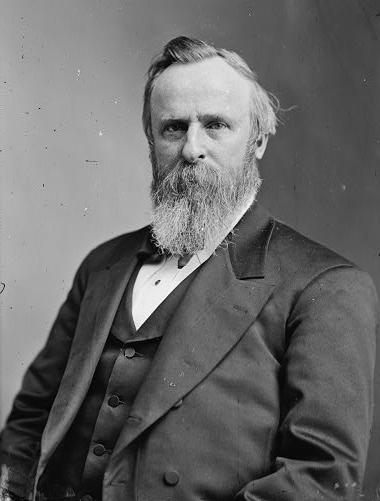
Rutherford
Birchard Hayes, the nineteenth president of the United States, was the
fifth child of Rutherford and Sophia Birchard Hayes, who came to Ohio
from Dummerston, Vermont in 1817. Hayes was born in Delaware,
Ohio on October 4, 1822. He never knew his father, who died
about two months after he was born.
Consequently, he and his sister, Fanny Arabella were raised by their
mother and her younger bachelor brother, Sardis Birchard, who was a
successful businessman in Lower Sandusky, later Fremont, Ohio.
Hayes attended school in Delaware and Norfolk, Ohio, and Middletown,
Connecticut. In 1842, as valedictorian, he graduated from Kenyon
College in Gambier, Ohio, and then went on to study law in a Columbus
law office. He then entered Harvard Law School and graduated in
1845. He began his law practice in Lower Sandusky, but the
opportunities were limited, so in 1849 he left, settling in Cincinnati
where he became a successful lawyer. With the Civil War not far
off, his opposition to slavery drew him into the Republican Party.
In 1852, Hayes married Lucy Ware Webb of Chillicothe, the youngest
daughter of Dr. James and Maria Cook Webb. She was a graduate of
Cincinnati’s Wesleyan Women’s College, and would become the first wife
of a president to have graduated from college.
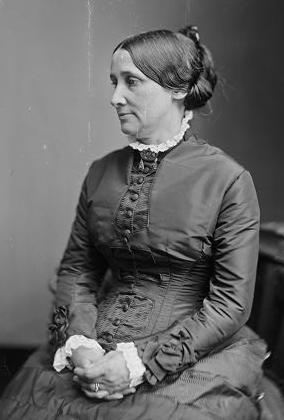
In 1861, when the Civil War began, Hayes volunteered his services to
the state of Ohio, and Governor William Dennison appointed him to the
rank of major in the 23rd Ohio Volunteer Infantry.
On September 14, 1982, one day after Antietam, Hayes was
severely wounded at the Battle of South Mountain. In 1864, while
still in the U.S. Army, he was elected to Congress, although he never
campaigned, and actually refused to do so. Hayes remained in the
Army, refusing his seat until the war was won by the Union. In 1866,
he was reelected, and the next year, Ohio voters elected him governor.
At the close of his second term in 1872, Hayes retired and moved to
Fremont, at Spiegel Grove, in May 1873. In 1875, after winning a third
term, the Republican Party nominated Hayes as its presidential
candidate. In 1876 Hayes won the election, after the creation of
a special commission that decided disputed electoral votes. Due
to tension among many surrounding the election, Hayes secretly took
the oath of office on Saturday March 3, 1877 in the Red Room of the
White House.
In 1877, the country was going through many problems and Hayes worked
hard to try to solve them. At this time, it was clear that the
nation’s voters were no longer willing to use military forces to
protect the civil rights of the freedmen. And, because Congress
refused to provide funding to do so, Hayes reassigned the few
remaining troops that were guarding two Southern statehouses. However,
before doing so, he received promises from southern leaders that they
would protect southern African Americans in their political, economic
and civil rights. Hayes had hoped that this action would help
heal the wounds left by the Civil War.
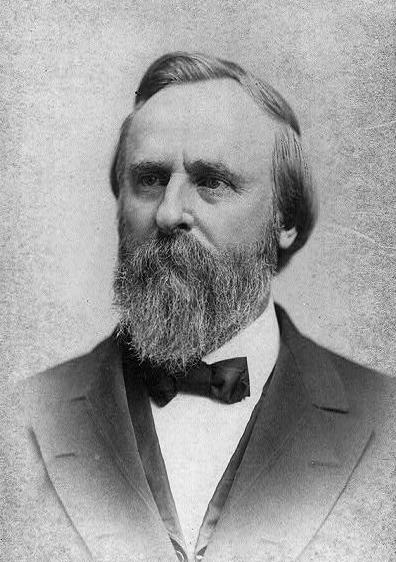
Hayes also had a strong policy concerning financial matters, which
helped make businesses and industry stronger. He also initiated civil
service reform, aimed at ending patronage, and used men with sound
qualification in government positions.
Hayes also signed into law a bill that for the first time, allowed
women attorneys to appear before the U.S. Supreme Court. Throughout
his term as president, Hayes continued his concern for minorities, the
poor and immigrants, and believed that education and manual training
helped all people achieve better lives. Because of his honesty,
there began a renewed respect for the presidency. Hayes refused
a second term, and honoring this commitment, after his presidency, he
retired to his home at Spiegel Grove.
In retirement, Hayes continued his work of helping veterans receive
pensions, improving conditions in prisons, and promoting education for
all.
Lucy Hayes, First Lady and Spiegel Grove
Lucy Webb was born in
Chillicothe, Ohio. Her father was from Lexington, Kentucky and
her mother from Connecticut. When Lucy was two years old, her father
died of cholera on a trip to Lexington to free some slaves he had
inherited. Her mother, with Lucy and her two brothers, searched for a
place to settle where the schooling was the best. On this search, Lucy
met Rutherford Hayes in Delaware. However, they did not stay in
Delaware, but settled in Cincinnati. Three years later, Hayes
rediscovered Lucy, and fell in love. They were married a year and one
half later, on December 30, 1852, in the home of Lucy's mother in
Cincinnati. For almost twenty years, Lucy was occupied and concerned
mostly with her eight children. Three were born before the Civil War;
two were born and died during the war, and three after the war, as
well as one more baby who died shortly after birth.
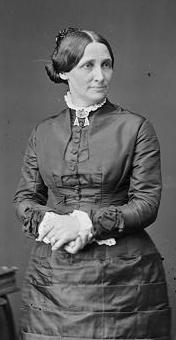
Rutherford Hayes served during the
Civil War, lastly as a Commander of a Brigade. After he was badly
wounded at the Battle of South Mountain, Lucy searched many hospitals
for him, finally locating him in a private house near Frederick,
Maryland, and nursed him back to health. At the end of the war, Hayes
was elected to Congress. Lucy believed this to be a turning point for
him, as she knew he loved politics. Upon his election to the
Presidency, Lucy, as mistress of the White House, held informal
receptions, where guests were free to stroll around the rooms and
grounds, have dinner, and return home early.
Lucy adapted her own way of life to
the White House, in a manner few others brought there. They would have
simple prayers at breakfast, and would sing hymns each Sunday evening.
Rutherford and Lucy retired to a home they inherited called Spiegel
Grove, in Fremont, Ohio. In retirement, Lucy was busy working and
lending her name as former First Lady to many charities.
Spiegel
Grove
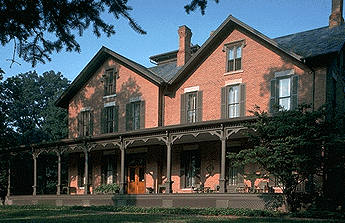
The home, library,
museum and tomb of Rutherford B. Hayes are located in a
twenty-five-acre park called Spiegel Grove, in Fremont, Ohio.
Wrought iron fencing and six original gates from the White House
surround the area.
The house was originally constructed by his guardian, Sardis Birchard
between 1859 and 1863, as a summer home he shared with his nephew and
family. The house took five years to complete because materials and
labor were hard to obtain during the Civil War.
The two-story brick house has eight bedrooms and a wraparound
verandah. Hayes loved the verandah area of the house, saying in
1873, “The best part of the present house is the veranda. But
I would enlarge it. I want a veranda with a house attached!”
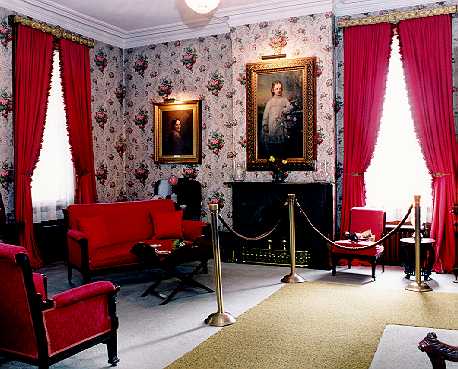
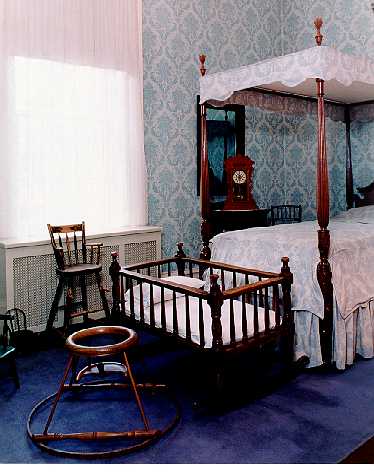
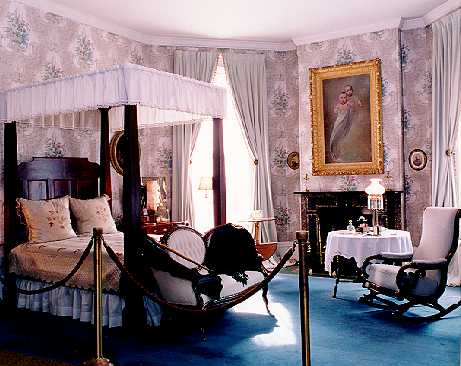
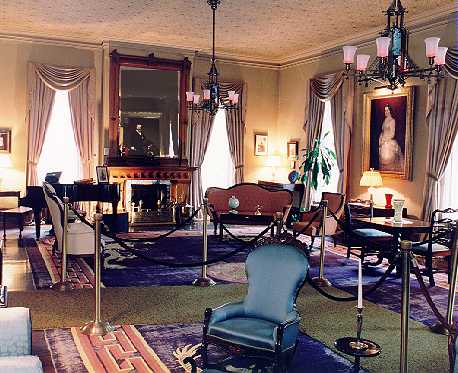
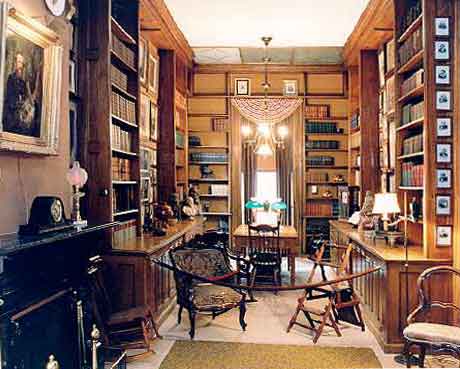
Hayes moved his family to Spiegel Grove in 1873 for only two years
before leaving to serve as Governor of Ohio, and then as President of
the United States. In 1880, Hayes prepared for his return to
Spiegel Grove after his presidency by building a large addition and
remodeling the interior. This addition, which can be seem today housed
his library, consisting of more than 12,000 books, three bedrooms, a
large reception room, and indoor plumbing. The most spectacular
improvement during the remodeling was a four-story walnut and
butternut staircase that leads to a room, built on the roof, known as
a lantern, that offers a 360-degree view of Spiegel Grove.
In 1889, Hayes remodeled again, in anticipation of visits from his
grandchildren and friends, whereby the back wing was demolished.
This was replaced with a larger wing that consisted of a larger dining
room, kitchen, servant’s quarters and five bedrooms. Sadly, Lucy
Hayes died on June 25, 1889, from a stroke, during this construction,
never having seen it completed. Rutherford B. Hayes died at Spiegel
Grove on January 17, 1893 at the age of seventy. Both Rutherford and
Lucy are buried at Spiegel Grove.
It is said that the Christmas season is one of the best times to visit
Spiegel Grove. Each Christmas the Victorian Guild, is the group of
volunteers who decorate the home in the fashion of the late 19th
century. They grow flowers and dry them, then fashion Victorian
Era decorations in various rooms of the thirty-three-room mansion.
If weather permits, between December 26 and 30, visitors are able to
take a horse-drawn carriage or sleigh ride on the grounds of the
estate. Across the street is the 1873 Dillon House, which is a
part of the Presidential Center, which is also decorated with
Victorian displays.
Quick
Biographical Facts:
RUTHERFORD
BIRCHARD HAYES
19th President
Term- March 4, 1877 to March 4,
1881
Republican Party
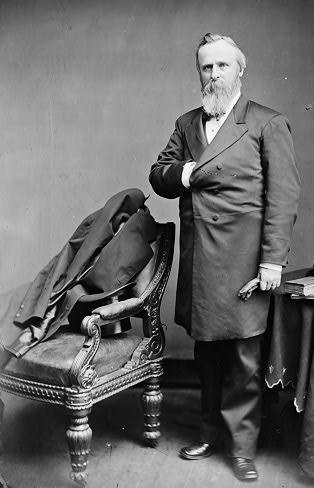
Birth: Delaware, Ohio, October 4,
1822
Ancestry: English, Scotch
Marriage: Cincinnati, Ohio,
December 30, 1852 to Lucy Ware Webb who was born in Chillicothe, Ohio,
August 28, 1831. Lucy died in Fremont, Ohio, June 25, 1889 and is
buried in "Spiegel Grove," Fremont, Ohio
Children: Birchard Austin
(1853-1926); Webb Cook (1856-1934); Rutherford Platt (1858-1927);
Joseph (1861-1863); George Crook (1864-1866); Fanny (1867-1950); Scott
(1871-1923); Manning (1873-1874)
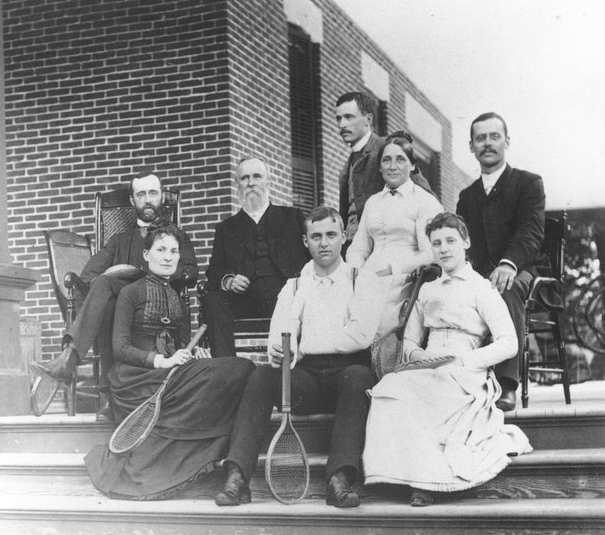
Home: Spiegel Grove, Fremont, Ohio
Education: Academy at Norwalk,
Ohio; Isaac Webb's school at Middletown, Connecticut; Kenyon College,
Gambier, Ohio; Harvard Law School
Religion: No specific denomination.
Attended Methodist
Occupation before Presidency:
Lawyer, soldier, and politician
Military Service: Commissioned
major in 13th Ohio Volunteers (1861); resigned as major general in
June 1865
Pre-Presidential Offices: City
Solicitor of Cincinnati, Ohio; U.S. Congressman; Governor of Ohio.
Age at Inauguration: 54
Hayes Administration: Vice
President: William A. Wheeler of New York, Inauguration, March 3, 1877, The Red Room, The
White House (private ceremony); March 5, 1877, The Capital,
Washington, D.C.
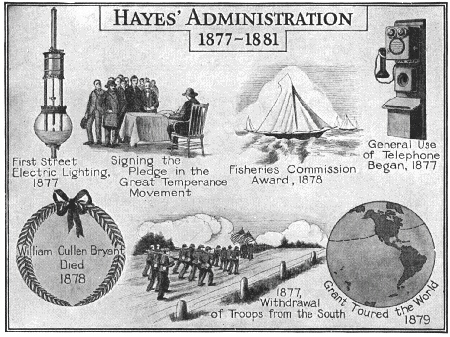
NOTE- Hayes was
the third President who postponed their oath taking ceremonies to
Monday because March 4th fell on a Sunday. However, because the
election had been so vigorously disputed, he had taken the oath
privately in the White House, Saturday, March 3, 1877. The
election/electoral vote was Hayes 185; Tilden 184
Occupation after Presidency:
Philanthropist; President of National Prison Association
Death: Fremont, Ohio, January 17,
1893
Cause of Death: Heart Attack at age
70
Place of Burial: Spiegel Grove
State Park, Fremont, Ohio
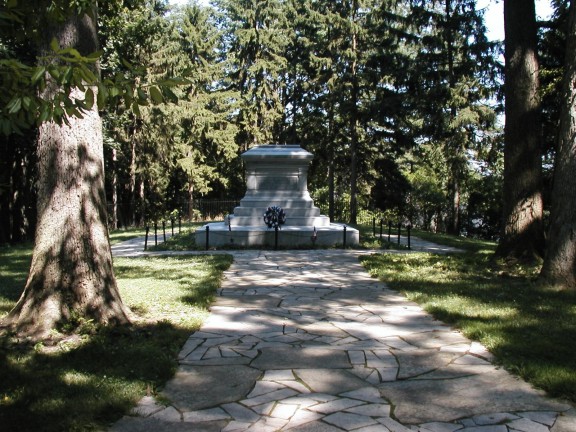
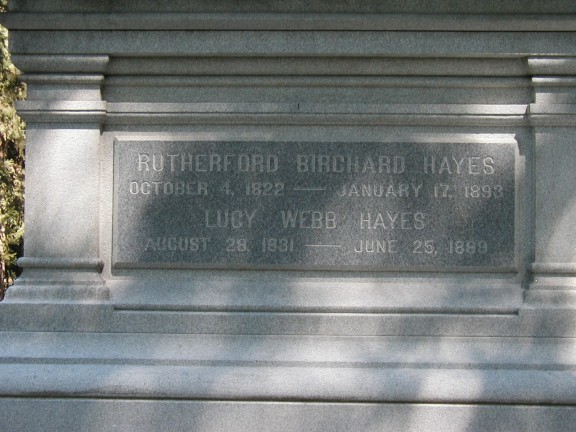
Interesting Facts:
·
Hayes was the first
president to take the oath of office at the White House.
·
Hayes was the only
president whose election was decided by a congressional commission.
·
Hayes was the first
president to travel to the west coast during his term as president.
·
Hayes was the first
president to have a telephone and a typewriter in the White House.
·
He was the first
President to start the annual Easter-egg hunt on the White House lawn,
in 1878.
·
Of the Presidents
that fought during the Civil War, Hayes was the only one who was
wounded-four times!
·
Lucy Hayes was the
first wife of a president to be called “first Lady,” and the first to
graduate from college.
·
To the delight of the
Women’s Christian Temperance Union, Lucy Hayes enforced her husband’s
orders to banish wines and liquors from the White House.
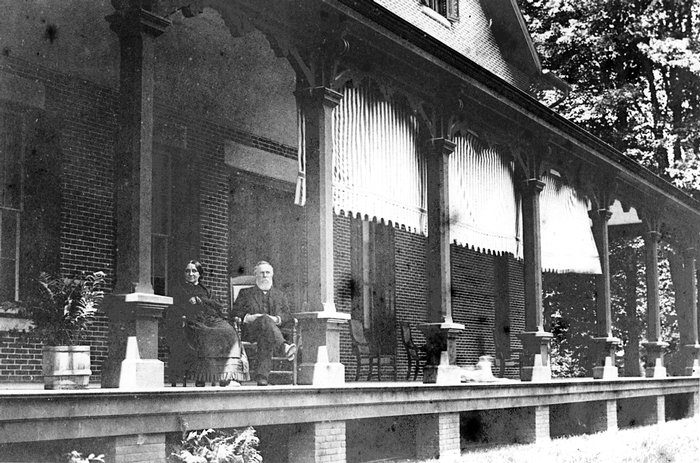
Copyright ©
1992-2022 by John T. Marck.
All Rights Reserved. This article and their accompanying pictures,
photographs, and line art, may not be resold, reprinted, or
redistributed for compensation of any kind without prior written
permission from the author. Photographs of Spiegel Grove and
informational assistance compliments of The Presidential center,
Spiegel Grove, Fremont, Ohio. Additional information from The
Presidents of the United States, and The First Ladies of the
United States, by John T. Marck.

